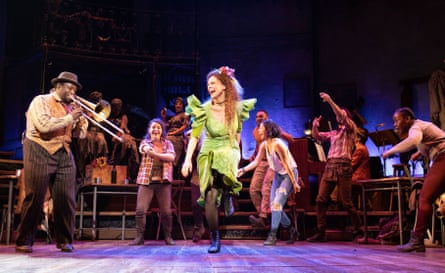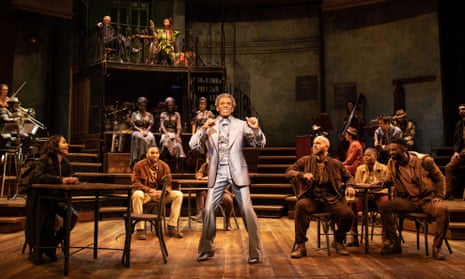This is a show that escapes easy definition. With music, lyrics and book by Anaïs Mitchell, it began life as a touring concert in 2006, was turned into a cult album and then, with the aid of director Rachel Chavkin, into an off-Broadway production. Whether you call it a folk opera, a hip oratorio or a musicalised myth, it boasts some cracking songs that far outweigh its dramatic shortcomings.
What strikes me most is its tendency, like its hero, to look backwards as well as forwards. Hadestown’s starting point is the classical legend of the poet-musican Orpheus, who descends into the underworld to rescue his beloved Eurydice. Watching it, I was reminded of the preoccupation of French playwrights and film-makers with the same story: Jean Anouilh wrote Eurydice in 1941 and Jean Cocteau directed Orphée in 1950. There is also more than a touch of 1920s American expressionism. When Mitchell’s Eurydice finds herself in a Hades filled with industrialised slaves, Eugene O’Neill’s The Hairy Ape, with its vision of dehumanised stokers, leapt to mind.

Mitchell, however, clearly intends Hadestown to be a fable for today. Persephone emerges from the underworld to celebrate spring and summer but in this version there is a seasonal chaos that suggests the impact of climate change. The show even gains a chilling topicality when Hades, the underworld boss, and his workers explain why they have built a protective wall around their kingdom: “The enemy is poverty / And the wall keeps out the enemy / And we build the wall to keep us free.” Pre-dating the Trump administration, the song reminds us of those societies that erect barriers out of fear and insecurity.
I am still puzzled as to Mitchell’s final intention. Is she saying that, with willpower, we can overturn the patterns of the past? Is she yearning for a cleaner, purer, preindustrial world? Whatever her mission, she has written exhilarating songs that have elements of trad jazz and folk. The narrator Hermes sets the ball rolling with a number that has the railroad rhythms of so much American popular music. Mitchell maintains that train-type momentum in Way Down Hadestown, which haunts you long after you have left the theatre, and in When the Chips Are Down, where the Fates stompingly assert their power.

Chavkin’s production, even in a large space, preserves the rough theatre elements that are part of the show’s charm. Rachel Hauck’s design suggests some decrepit New Orleans dive, and the band, with Nathaniel Cross prominent on trombone, is vividly present. The performers, headed by Reeve Carney and Eva Noblezada as the young lovers, are all good, even if Orpheus’s song that wins him an underworld reprieve can’t stand comparison with Gluck or Offenbach.
The standout performance comes from Patrick Page who, as Hades, has a voice that seems to issue, appropriately, from the depths. He is excellently partnered by Amber Gray as a half-pissed Persephone and well supported by André de Shields as a Hermes who periodically sports the kind of fringed umbrella you’d see at a funeral in the deep south. I’m not sure if Mitchell’s classical update imparts a palpable message, but her beguiling melodies linger on.
At the National’s Olivier theatre, London, until 26 January.









Comments (…)
Sign in or create your Guardian account to join the discussion